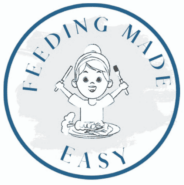Believe it or not this is one of the most common complaints I hear from parents. It’s super common for toddlers to suddenly reject eating meat, even if they ate meat totally fine as a baby. There can be many reasons that your toddler won’t eat meat, but most of the time, it’s not something that you need to stress too much about.
If your family is vegetarian or vegan, there is no reason that you NEED to serve your child meat (or any food). This is more for families who usually eat meat, but are finding that their child has been rejecting it.
This post may contain affiliate links and when you click on the links I may earn a small commission at no charge to you. As an Amazon affiliate, I earn a commission from qualifying purchases.
Reasons Why a Toddler Won’t Eat Meat
Texture
The most common reason I have seen for meat refusal is texture. Even for kids without sensory sensitivities, meat is a tricky texture. It can be a bit tough or chewy and require a little more work than other textures. If you think texture may be a concern for your child, try offering meat in a variety of ways: ground meat in sauces (like pasta sauce), shredded or with gravies. Most kids do better with meat that is moist.
Flavor
Every kid will have different flavor preferences. Your child may not like the umami flavor in meat. Kids generally prefer more sweet foods over savory. You can try cooking meat in different ways with different sauces or seasonings to alter the taste a bit.
It’s More Challenging
Even if they don’t have an issue with the texture of meat, it can be more difficult to chew in general. Some kids will prefer foods that are a bit easier. Again, offer it well cooked and very tender so that it’s easier to chew.
They’re Not as Hungry
Overall, kids have a huge relative decrease in energy needs after age 1. Their growth slows down tremendously, so they aren’t as hungry. This means that they may not want to eat as many foods as they did when they were a baby. It’s one of the reasons we see an increase in picky eating in the toddler age.
Low Protein Needs
Kids have surprisingly low protein needs. Many toddlers can meet 100% of their protein needs from their milk intake alone (if your kid doesn’t like milk that’s ok too, it’s just an example). They tend to be pretty intuitive eaters and may instinctually realize that they don’t need the protein found in meat.
What You Can Do
Keep Offering
As with most picky eating tips, keep offering! You can offer tiny servings to minimize waste. Try new recipes. Look for meats with sauces or gravies. Try ground meat or shredded meat. You may find that all of a sudden your child will eat meat again. For my older child around age 4, he started eating meat again one night and was annoyed that we gave him the tiniest possible serving (even though the night before he refused to eat it). We’re still waiting on my younger son.
Sauces and Gravies Are Your Friend
Due to many kids having problems with texture or not wanting to chew the meat, mixing it into sauces and gravies can really help. I’m not recommending trying to hide the food, they should know the meat is in there, but it will help a lot with the texture. Some kids do not like mixed foods, but for many others the addition of the sauce makes it way easier to eat.
Shred Meat
Shredding meat helps with texture as well. If you make meat in the instant pot or slow cooker, you can actually use a hand mixer to shred the meat super easily (if there are no bones). This is one of my favorite kitchen hacks.
Opt for Meat Alternatives
You don’t need to get beyond burgers, but try to find other sources of iron for your child. While their protein needs are low, their iron and zinc needs are still higher. Foods like beans and lentils are great options that many toddlers like and are also good sources of iron. If your child doesn’t like one kind of bean, just try another! There are so many! And yes, canned beans are a great choice. You can look for low sodium and give them a rinse if you’re watching salt intake.

Krystyn Parks is a Registered Dietitian and Lactation Consultant who specializes in feeding children. She has a Master’s Degree in Nutritional Science from California State University Long Beach. She is an International Board Certified Lactation Consultant and has been registered with the Commission on Dietetic Registration since 2013.
